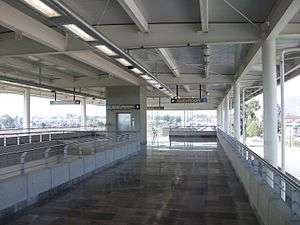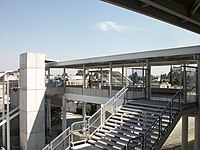Metro Tlaltenco
Tlaltenco (![]()
| STC rapid transit | ||||||||||||||||||||||||||||||||||||||||||||||||||||||||||||||||||||||||||||||||||||||||||||||||||||||||||||||||||||||||||||||||||||||||||||||||||||||||||||||||||||||||||||||||||||||||||||||||
 Lobby, 2012 | ||||||||||||||||||||||||||||||||||||||||||||||||||||||||||||||||||||||||||||||||||||||||||||||||||||||||||||||||||||||||||||||||||||||||||||||||||||||||||||||||||||||||||||||||||||||||||||||||
| Location | Canal del Acalote Tláhuac, Mexico City Mexico | |||||||||||||||||||||||||||||||||||||||||||||||||||||||||||||||||||||||||||||||||||||||||||||||||||||||||||||||||||||||||||||||||||||||||||||||||||||||||||||||||||||||||||||||||||||||||||||||
| Coordinates | 19.294380°N 99.024104°W | |||||||||||||||||||||||||||||||||||||||||||||||||||||||||||||||||||||||||||||||||||||||||||||||||||||||||||||||||||||||||||||||||||||||||||||||||||||||||||||||||||||||||||||||||||||||||||||||
| Operated by | Sistema Transporte Colectivo Metro | |||||||||||||||||||||||||||||||||||||||||||||||||||||||||||||||||||||||||||||||||||||||||||||||||||||||||||||||||||||||||||||||||||||||||||||||||||||||||||||||||||||||||||||||||||||||||||||||
| Line(s) | Line 12 | |||||||||||||||||||||||||||||||||||||||||||||||||||||||||||||||||||||||||||||||||||||||||||||||||||||||||||||||||||||||||||||||||||||||||||||||||||||||||||||||||||||||||||||||||||||||||||||||
| Platforms | 1 island platform | |||||||||||||||||||||||||||||||||||||||||||||||||||||||||||||||||||||||||||||||||||||||||||||||||||||||||||||||||||||||||||||||||||||||||||||||||||||||||||||||||||||||||||||||||||||||||||||||
| Tracks | 2 | |||||||||||||||||||||||||||||||||||||||||||||||||||||||||||||||||||||||||||||||||||||||||||||||||||||||||||||||||||||||||||||||||||||||||||||||||||||||||||||||||||||||||||||||||||||||||||||||
| Construction | ||||||||||||||||||||||||||||||||||||||||||||||||||||||||||||||||||||||||||||||||||||||||||||||||||||||||||||||||||||||||||||||||||||||||||||||||||||||||||||||||||||||||||||||||||||||||||||||||
| Structure type | Surface | |||||||||||||||||||||||||||||||||||||||||||||||||||||||||||||||||||||||||||||||||||||||||||||||||||||||||||||||||||||||||||||||||||||||||||||||||||||||||||||||||||||||||||||||||||||||||||||||
| Disabled access | Yes | |||||||||||||||||||||||||||||||||||||||||||||||||||||||||||||||||||||||||||||||||||||||||||||||||||||||||||||||||||||||||||||||||||||||||||||||||||||||||||||||||||||||||||||||||||||||||||||||
| History | ||||||||||||||||||||||||||||||||||||||||||||||||||||||||||||||||||||||||||||||||||||||||||||||||||||||||||||||||||||||||||||||||||||||||||||||||||||||||||||||||||||||||||||||||||||||||||||||||
| Opened | 30 October 2012 | |||||||||||||||||||||||||||||||||||||||||||||||||||||||||||||||||||||||||||||||||||||||||||||||||||||||||||||||||||||||||||||||||||||||||||||||||||||||||||||||||||||||||||||||||||||||||||||||
| Traffic | ||||||||||||||||||||||||||||||||||||||||||||||||||||||||||||||||||||||||||||||||||||||||||||||||||||||||||||||||||||||||||||||||||||||||||||||||||||||||||||||||||||||||||||||||||||||||||||||||
| Passengers (2019) | 1,274,784[1] | |||||||||||||||||||||||||||||||||||||||||||||||||||||||||||||||||||||||||||||||||||||||||||||||||||||||||||||||||||||||||||||||||||||||||||||||||||||||||||||||||||||||||||||||||||||||||||||||
| Rank | 192/195[1] | |||||||||||||||||||||||||||||||||||||||||||||||||||||||||||||||||||||||||||||||||||||||||||||||||||||||||||||||||||||||||||||||||||||||||||||||||||||||||||||||||||||||||||||||||||||||||||||||
| Services | ||||||||||||||||||||||||||||||||||||||||||||||||||||||||||||||||||||||||||||||||||||||||||||||||||||||||||||||||||||||||||||||||||||||||||||||||||||||||||||||||||||||||||||||||||||||||||||||||
| ||||||||||||||||||||||||||||||||||||||||||||||||||||||||||||||||||||||||||||||||||||||||||||||||||||||||||||||||||||||||||||||||||||||||||||||||||||||||||||||||||||||||||||||||||||||||||||||||
| ||||||||||||||||||||||||||||||||||||||||||||||||||||||||||||||||||||||||||||||||||||||||||||||||||||||||||||||||||||||||||||||||||||||||||||||||||||||||||||||||||||||||||||||||||||||||||||||||
| Location | ||||||||||||||||||||||||||||||||||||||||||||||||||||||||||||||||||||||||||||||||||||||||||||||||||||||||||||||||||||||||||||||||||||||||||||||||||||||||||||||||||||||||||||||||||||||||||||||||
 Tlaltenco Location within Mexico City urban area | ||||||||||||||||||||||||||||||||||||||||||||||||||||||||||||||||||||||||||||||||||||||||||||||||||||||||||||||||||||||||||||||||||||||||||||||||||||||||||||||||||||||||||||||||||||||||||||||||
Location

Tlaltenco is a metro station located on Canal del Acalote Avenue, Tláhuac borough, southeastern Mexico City. The station serves the San Francisco Tlaltenco town (es). Within the system, the station lies between Zapotitlán and Tláhuac.[3]
History and construction
Line 12 of Mexico City Metro was built by Grupo ICA (es), in association with Alstom Mexicana and Grupo Carso.[4] Tlaltenco and Tláhuac are built at street level, and the track goes from surface to elevated level between the Tlaltenco–Zapotitlán interstation.[5] The station was opened on 30 October 2012, on the first day of the Mixcoac–Tláhuac service.[6] and the facilities are accessible for the handicapped.[7] The pictogram represents a stone gateway located in the town.[3] Known as La Puerta de Tlaltenco (lit.transl. Tlaltenco's Gateway), the landmark was used as a customs point to control the transit of goods.[2]
Incidents
From 12 March 2014[8] to 29 November 2015,[9] Tlaltenco was closed due to technical and structural faults in the stretch Atlalilco–Tláhuac.[10][11] After the 2017 Puebla earthquake damaged the Line 12 tracks, Tlaltenco remained closed until 30 October 2017.[12][13] From 23 April to 28 June 2020, the station was temporarily closed due to the COVID-19 pandemic in Mexico.[14][15]
Ridership
In 2019, Tlaltenco station had an overall ridership of 1,274,784 passengers,[1] which was an increase of 155,870 passengers compared to 2018.[16] In the same year, Tlaltenco was the 192nd busiest station in the system, out of a total of 195 stations, and it was the least busy on Line 12.[1]
| Annual passenger ridership | |||||
|---|---|---|---|---|---|
| Year | Ridership | Average daily | Rank | Ref. | |
| 2019 | 1,274,784 | 3,492 | 192/195 | [1] | |
| 2018 | 1,118,914 | 3,065 | 193/195 | [16] | |
| 2017 | 898,824 | 2,462 | 193/195 | [17] | |
| 2016 | 864,854 | 2,362 | 194/195 | [18] | |
| 2015 | 68,333 | 187 | 195/195 | [19] | |
| 2014 | 148,671 | 407 | 195/195 | [20] | |
| 2013 | 783,193 | 2,145 | 195/195 | [21] | |
| 2012 | 100,733 | 275 | 195/195 | [22] | |
References
- "Afluencia de estación por línea 2019" (in Spanish). Sistema Transporte Colectivo Metro. 2020. Archived from the original on 8 April 2020. Retrieved 3 May 2020.
- "San Francisco Tlaltenco" (in Spanish). Government of Tláhuac. Archived from the original on 8 October 2019. Retrieved 2 July 2020.
- "Tlaltenco" (in Spanish). Sistema de Transporte Colectivo. Archived from the original on 16 November 2018. Retrieved 20 August 2011.
- "¿Quién construyó la línea 12 del Metro?". Expansión (in Spanish). 11 March 2014. Archived from the original on 2 July 2020. Retrieved 2 July 2020.
- "La Ingeniería Civil en la línea 12 del metro de la Ciudad de México". Vector (in Spanish). Archived from the original on 13 September 2020.
- "Que no se te vaya el tren". Chilango (in Spanish). 30 October 2020. Archived from the original on 2 July 2020. Retrieved 2 July 2020.
- "12 datos de la 'La línea dorada' del Metro inaugurada este martes" (in Spanish). Aristegui Noticias. 30 October 2012. Archived from the original on 5 November 2012. Retrieved 26 May 2020.
- "Línea 12 del metro cierra 12 estaciones por seis meses" (in Spanish). Animal Político. 11 March 2014. Archived from the original on 24 July 2020. Retrieved 3 July 2020.
- Rodea, Felipe (29 November 2015). "Mancera reabre Línea 12 del Metro". El Financiero (in Spanish). Archived from the original on 4 July 2020. Retrieved 3 July 2020.
- "Caos en primer día de cierre en 12 estaciones de la Línea Dorada del Metro". Proceso (in Spanish). Mexico City. 12 March 2012. Archived from the original on 4 July 2020. Retrieved 3 July 2020.
- "¿Por qué el GDF cerró la Línea 12 del Metro?" (in Spanish). Aristegui Noticias. 11 March 2020. Archived from the original on 28 May 2019. Retrieved 3 July 2020.
- "Cuatro estaciones de L12 del Metro permanecerán cerradas durante 4 semanas" (in Spanish). Noticieros Televisa. 24 September 2017. Archived from the original on 14 April 2020. Retrieved 3 July 2020.
- "Metro reabre tramo dañado de Línea 12". El Heraldo de México (in Spanish). 30 October 2017. Archived from the original on 3 March 2018. Retrieved 3 July 2020.
- "Cierre temporal de estaciones" (PDF) (in Spanish). Sistema Transporte Colectivo Metro. Archived (PDF) from the original on 4 July 2020. Retrieved 25 April 2020.
- Hernández, Eduardo (13 June 2020). "Coronavirus. Este es el plan para reabrir estaciones del Metro, Metrobús y Tren ligero". El Universal (in Spanish). Archived from the original on 4 July 2020. Retrieved 15 June 2020.
- "Afluencia de estación por línea 2018" (in Spanish). Sistema Transporte Colectivo Metro. 2019. Archived from the original on 6 June 2019. Retrieved 7 April 2020.
- "Afluencia de estación por línea 2017" (in Spanish). Sistema Transporte Colectivo Metro. 2019. Archived from the original on 3 May 2020. Retrieved 3 May 2020.
- "Afluencia de estación por línea 2016" (in Spanish). Sistema Transporte Colectivo Metro. 2017. Archived from the original on 3 May 2020. Retrieved 3 May 2020.
- "Afluencia de estación por línea 2015" (in Spanish). Sistema Transporte Colectivo Metro. 2016. Archived from the original on 3 May 2020. Retrieved 6 May 2020.
- "Afluencia de estación por línea 2014" (in Spanish). Sistema Transporte Colectivo Metro. 2015. Archived from the original on 3 May 2020. Retrieved 6 May 2020.
- "Afluencia de estación por línea 2013" (in Spanish). Sistema Transporte Colectivo Metro. 2014. Archived from the original on 3 May 2020. Retrieved 6 May 2020.
- "Afluencia de estación por línea 2012" (in Spanish). Sistema Transporte Colectivo Metro. 2013. Archived from the original on 3 May 2020. Retrieved 6 May 2020.
External links
| Wikimedia Commons has media related to Tlaltenco (station). |
- "Metro Tlaltenco". at the Official Guide to Mexico City.